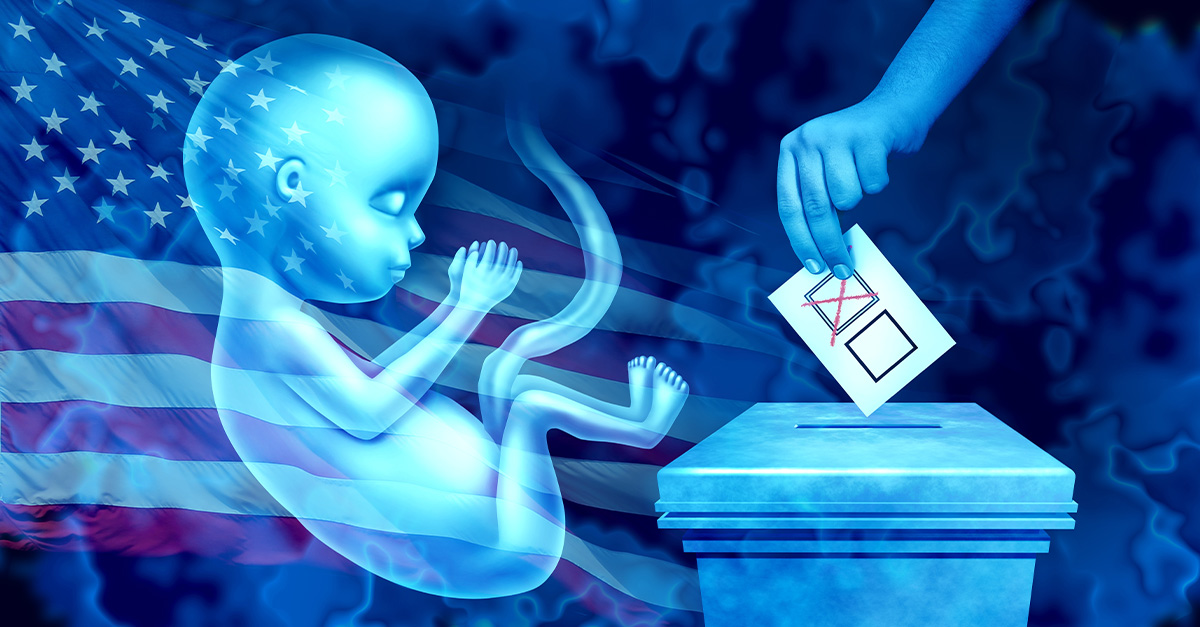


Get a free copy of Parental Rights & Education when you subscribe to our newsletter!

Many of us may feel despondent at these setbacks, but we cannot give up. We must run the race before us and not quit. And we must look to Christ, the author and finisher of our faith, for strength, courage, and wisdom (Hebrews 12:1-2). The lives of our nation’s children are fully at stake.
Five states had abortion amendments on the ballot on November 8 and, sadly, the pro-life movement lost in all five states. Here is a rundown of what took place on Election Day:
In one of the most disappointing votes for pro-lifers, highly conservative Kentucky failed to pass Amendment 2, also known as the No Right to Abortion in Constitution Amendment.
The amendment asked, “Are you in favor of amending the Constitution of Kentucky by creating a new Section of the Constitution to be numbered Section 26A to state as follows: To protect human life, nothing in this Constitution shall be construed to secure or protect a right to abortion or require the funding of abortion?”
Voting “yes” would have amended the Kentucky Constitution to state that there is no right to an abortion in the state constitution.
As of the time of writing, 90 percent of precincts are reporting and the amendment is set to be defeated, with 52.4 percent of voters rejecting the amendment. While Kentucky has a large Republican majority in its legislature and has enacted a ban on abortion in most cases, as well as a ban on abortion after a baby’s heartbeat is detected, abortion advocates came out in force against the amendment.
Some point to the wide difference in funding, with $5.2 million going to pro-abortion group Project Kentucky Access compared to $952,000 for the pro-life Yes for Life group. Large portions of Project Kentucky Access’s funding came from out-of-state including $500,000 each from the Advocacy Action Fund of Menlo Park in California; the Charles and Lynn Schusterman Family Philanthropy of Tulsa, Oklahoma; and the Sixteen Thirty Fund of Washington, D.C.
The results come after a Civiqs poll showed that 54 percent of Kentucky respondents thought that abortion should be illegal in most or all cases.
Over the summer, Jefferson County Circuit Judge Mitch Perry blocked Kentucky’s ban on abortion and ban on abortions after a baby’s heartbeat is detected, citing the “rights to privacy and self-determination” protected by the Kentucky Constitution.
Attorney General Daniel Cameron appealed that ruling and the state’s appellate court reinstated the laws. The defeat of the amendment does not invalidate the state’s abortion laws, but the amendment would have helped prevent judges from finding a right to an abortion in the state constitution.
The Kentucky Supreme Court will hear arguments regarding the state’s abortion laws next week.
Vermont Proposal 5, also known as the Right to Personal Reproductive Autonomy Amendment, was passed after 77.3 percent of voters voted “yes.” Proposal 5 added language to the Vermont Constitution reading, “That an individual’s right to personal reproductive autonomy is central to the liberty and dignity to determine one’s own life course and shall not be denied or infringed unless justified by a compelling State interest achieved by the least restrictive means.”
California voters approved Proposition 1, which says, “The state shall not deny or interfere with an individual’s reproductive freedom in their most intimate decisions, which includes their fundamental right to choose to have an abortion and their fundamental right to choose or refuse contraceptives.”
The amendment fails to include a viability standard, indicating that abortion will be legal up to the moment of birth.
Proposition 3, otherwise known as the Right to Reproductive Freedom Initiative, was approved by 56.6 percent of voters. It grants a constitutional right to an abortion, even after the point of viability if a doctor claims it is for the physical or mental health of the mother.
The amendment strikes down a 1931 law banning abortion in Michigan. There is also concern among pro-lifers that this amendment, as broadly written, can be interpreted to allow minors to get abortions or gender-affirming treatments without parental consent.
LR-131, also known as the “Born-Alive Infant Protection Act,” stated that infants born alive, “including after an attempted abortion,” are legal persons and medical professionals would be required to “take necessary actions to preserve the life of a born-alive infant.”
Amazingly, 53 percent of voters voted against the amendment. This means that this simple amendment, trying to provide protections for children who are born and living outside of the womb, whether the result of an abortion or not, failed. Now, in some circumstances, these babies may be left to die, and the doctor or other healthcare provider responsible won’t face legal consequences.

Including the defeat in Kansas earlier this year, the pro-life cause has failed in six ballot amendments since Roe v. Wade was overturned. California and Vermont are heavily Democrat states, but the expansion of abortion in those states is alarming. The other states present a different type of concern. Michigan is light blue, while Kansas, Kentucky, and Montana are all varying shades of red. This shows the pro-life cause has a great deal of work to do and must look closely at future tactics and strategies.
There is no question that the pro-abortion lobby spent millions and used all of its celebrity power to confuse and manipulate voters. That’s why one place for the pro-life movement to focus on is in better educating Americans on what abortion actually entails, as well as the reality of abortion in America compared to other countries.
A study from Notre Dame University, entitled “How Americans Understand Abortion,” found that Americans are not “particularly knowledgeable about the details of abortion.” Their views are convoluted. Americans have often not thought deeply about abortion.
It is critical that we help people understand the absolute barbarity of abortion. It is not some magical disappearance of “a clump of cells” that could have been a baby, as so many want to believe. It is the brutal dismemberment or chemical burning of a child. Medical professionals don’t all agree on when a baby can feel pain, but many experts agree it is by 12 weeks’ gestation.
Do most Americans really understand that abortion, in many cases, involves using clamps to rip off the arms and legs of a helpless child who can feel pain and suffer? Probably not (though the result in Montana is particularly disheartening, since more than 200,000 Montanans callously voted to let medical professionals legally ignore the pain and suffering of a newly born child).
We need to somehow change that understanding.
Abortion is a moral issue, and churches must inform their congregants of the need to not only support pro-life causes but also to go out and vote for pro-life ballot measures and pro-life candidates.
Another area we must improve on is messaging. The left is very adept at coming up with euphemisms and slogans designed to induce emotion and hide the reality of abortion, such as “reproductive freedom,” “a woman should control her own body,” “my body, my choice,” as well as falsely claiming abortion is necessary for the health and well-being of women. Conservatives must learn to more effectively engage the hearts and minds of voters and make sure they clearly understand what’s at stake. Nowhere is this more evident than with the ballot amendments regarding constitutional rights.
The Standing for Freedom Center discussed this problem when the Kansas ballot amendment failed and warned of potential problems with the Kentucky amendment.
Voters do not realize that if they add the right to an abortion in their state constitution, that doesn’t mean they protected a woman’s right to choose an abortion in some cases. It means that abortion can be provided in nearly all cases, even up to the moment of birth.
A Harvard CAPS Harris Poll showed that only 10 percent of respondents agreed with the left’s view that abortion should be allowed up to nine months’ gestation and an additional 18 percent thought abortion should be legal up to 23 weeks’ gestation, but 72 percent of respondents said that abortion should be illegal after 15 weeks and 12 percent said it should be illegal after six weeks. And 37 percent said that abortion should only be allowed in cases of rape or incest.
Americans simply do not understand the ramifications of codifying Roe or adding a constitutional right to an abortion. In states like Kentucky, judges could potentially stop legislators from enacting restrictions that voters support because voters didn’t support Amendment 2. Legislators must move away from legalese and unambiguously explain what the ballot amendments will do.
The most important thing that Christians must do, however, is pray. We must recognize that this is a spiritual battle. We are living in a country that is no longer predominantly Christian but rather is a desperately lost nation. And even those who profess Christ are misinformed on moral issues such as abortion. We must repent of our sins, repent of our apathy regarding this issue, and return to Christ. We must begin praying even more intensively each day for lost souls and for God to awaken darkened hearts. We must plead that God will change hearts and that abortion will be defeated.
Many of us may feel despondent at these major setbacks, but even as the Roe decision was being thrown on the trash heap of history, Christians knew that the fight would continue and that it would be just as fierce, if not more so. We cannot give up. We must run the race before us and not quit. And we must look to Christ, the author and finisher of our faith, for strength, courage, and wisdom (Hebrews 12:1-2). The lives of our nation’s children are fully at stake.
Ready to dive deeper into the intersection of faith and policy? Head over to our Theology of Politics series page where we’ve published several long-form pieces that will help Christians navigate where their faith should direct them on political issues.
Christian conservative news and issues that matter. Curated just for you!
